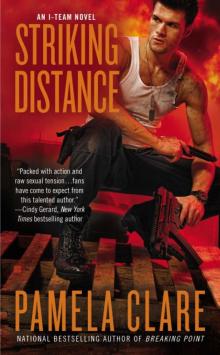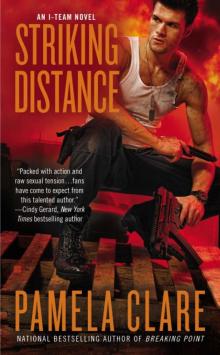- Home
- Pamela Clare
Hard Line Page 2
Hard Line Read online
Page 2
Jones grinned. “I like it.”
Segal’s gaze was on the screen. “That’s game-changing technology.”
Thor saw where this was going. “Someone wants to steal it.”
Tower nodded. “That’s the Pentagon’s theory. Our job is to get to the crash site and retrieve sensitive components. But we’ve got serious obstacles to overcome if we’re going to succeed. Isaksen, I’m placing you in command of operations on this one. You’re the only one of us with experience in this kind of environment. I’m counting on you to help us prepare.”
“Understood.” Thor had anticipated this.
Tower fixed his gaze on Jones and Segal. “Will either of you have problems following orders from Isaksen?”
They had been with the company longer than Thor, and both had more straight-up combat experience.
“No, sir.”
“Hell, no.”
Tower went over the plan. “When a weather window opens, you’ll fly to Amundsen-Scott Station on a specially equipped aircraft. It will be a rough flight. If the pilot is able to land, you’ll have to disembark quickly. He has to keep the plane running during refueling, or the propellers and fuel will freeze.”
“That’s how it was in Greenland, too.” Except then, Thor hadn’t just offloaded himself and his gear, but also eleven dogs, the sled, and hundreds of kilos of supplies.
“If the weather holds, you’ll take a Twin Otter with a ferry tank to the crash site, retrieve the package, re-board the plane, and head back to the station. Then it’s just a matter of waiting for a window for your ride back. Due to altitude and consistently cold temperatures, weather at the Pole itself is fairly stable. But the continent overall has the harshest winds and coldest temps on the planet. Getting you safely there and back entails looking at the forecast along your entire flight path, not just local conditions.”
That made sense to Thor.
“I’ll remain in Christchurch, working as the go-between for our operation and the government of New Zealand. We’ll check in via a laptop equipped with satellite VPN.”
“Why retrieve the technology? Why can’t we just blow it up?” Segal asked.
“Plastic explosives are unreliable in that kind of cold,” Tower explained. “Also, by treaty, nations are required to remove all waste. Someone will have to fly out to the crash site in austral summer to remove the wreckage. If we blow it up, that would make their job close to impossible, wouldn’t it?”
Tower and Thor spent the next few hours breaking down each step of the operation, trouble-shooting the entire mission from beginning to end.
“What happens if we get hit by a storm while we’re out there?” Jones asked.
Thor didn’t mince words. “We freeze to death.”
Tower’s lips pressed into a frown. “You’ll take survival gear—enough to hold out several days on the ice, if necessary.”
Thor glanced at his smartphone. “It’s minus fifty-seven Celcius there right now—minus eighty-two with the wind chill. Antarctic storms can bring katabatic winds that are equivalent to a Category Four hurricane. But, sure, let’s take a tent and maybe some hot cocoa with marshmallows, too.”
Segal snorted. “Smartass.”
Jones looked worried. “How about a snow cave or sheltering on the plane?”
Thor shook his head. “It’s not snow. It’s ice. You don’t dig. You drill. The plane’s fuel will quickly turn to unusable slush, and then we freeze.”
Segal looked at satellite photos of the crash site. “How do we know the components we need to remove are accessible? What if they’re buried in the ice?”
Tower answered. “The Pentagon has a scientist at the station who will handle that part of the operation, someone who has experience with space tech. It’s our job to get that person to the site and keep them safe.”
“Are we expecting polar bears?” Segal asked.
“There is no life inland in Antarctica.” Tower pointed toward a black dot on the map. “But Vostok Station—the year-round Russian base—is four-hundred fifty miles from the crash site. The Russians have kindly offered to help our salvage efforts, but Washington has declined.”
“Intelligence believes the Russians are behind the hack?” Segal asked.
“It’s all speculation at this point. It could be the Russians. It could be the Chinese. Both have bases within striking distance of the crash site, though Kunlun, the Chinese station, isn’t staffed during the winter.”
“If it’s the Russians, the team at Vostok might have known about it ahead of time.” Thor was just stating the obvious. “In the time it takes us to get to Antarctica, they could easily beat us to the crash site. Also, this area of the continent—Dome A—has the coldest temperatures ever recorded on earth.”
He’d been researching Antarctica since they took off from Denver.
The four of them sat in silence, the full scope of this operation hitting home.
“You should know that the NSF—the National Science Foundation—has fought the Pentagon every step of the way on this,” Tower said. “By treaty, no nation is allowed to have a military presence in Antarctica unless the military serves a scientific purpose. That’s why they’re sending us. You’re security, nothing more. You’ll go in armed with revolvers and bolt-action Enfield rifles—”
“Bolt-action rifles?” Jones stared at Tower as if he’d lost his mind.
Thor laid it out for him. “Your M4 would freeze up in the cold. We carried Enfields in Sirius. It was the only rifle we trusted against polar bears.”
Jones looked unimpressed. “Huh.”
Tower picked up where he’d left off. “Your weapons come out only at the crash site and only if needed. I’m told you can expect a less than cordial welcome from the staff on station.”
Segal’s expression went sour. “Nice.”
It didn’t bother Thor. Who cared what the researchers thought of them so long as they got the job done?
Tower met each man’s gaze in turn. “I’m not exaggerating when I say this might be the most dangerous mission in Cobra’s history. You cannot let this technology fall into hostile hands.”
2
April 9
When Steve called Samantha into his office, she thought it had to do with Patty’s death. Instead, it was about the crashed satellite.
“A security team is on its way here from Christchurch. They’ll be flown out to the crash site to retrieve sensitive military technology and take it back to the US.”
“That’s crazy. What if they crash—or land in a crevasse? They’re risking their lives, and for what? Technology?”
“It gets crazier.” Steve drew a breath and exhaled, as if he didn’t know how to tell her what he had to say next. “The NSF wants you to go with them to remove the components.”
What the hell?
She gaped at him. “Go with them? I’m an astronomer. I have work to do here. I don’t know anything about military systems. They need to send an expert, one of their own people. I’m not going out there. Are you bonkers?”
This was her second year as a winter-over. She knew how dangerous it was to fly in austral winter. It had happened only a few times in Antarctic history in response to medical emergencies. Besides, Samantha got enough of the cold every day on her fifteen-minute walk to and from the Dark Sector Lab and SPT—the South Pole Telescope. She wasn’t leaving the station and going out on the ice.
Hell, no.
“Look, I know you’re going through a hard time right now, but out of the fifty people down here, the NSF and the Pentagon believe you have the skill to do this. They requested Patty, actually, but… They’re not going to risk sending anyone else.”
“Are you saying I have no choice?”
“Of course, you have a choice, but you have to understand what’s at stake here. There’s a top-secret system on that satellite that could mean the deaths of millions of innocent people if it fell into the wrong hands. Patty would have done it.”
“Do
n’t try to manipulate me, Steve. The satellite is sitting in the middle of the continent in winter. It’s not like ISIS is going to sneak in and steal it.”
“No, but someone else might.”
“Who? The Russians? The Chinese? Their stations are staffed by scientists just like us. We don’t do world politics or Cold War bullshit down here.”
Researchers from around the globe came to Antarctica to work together for the sake of science. There were no international tensions here, no military presence. There was barely any law enforcement—just the Special Deputy US Marshal who worked as the station manager at McMurdo.
“Don’t be naïve. You heard what Vasily said last time we saw him. ‘All the science is a pretext for maintaining a presence here so we can stake a claim.’”
“Vasily was drunk.”
Everyone had been drunk that night, one of the few times that astronomers from different countries could gather at McMurdo for a drink.
“In vino veritas.” Steve crossed his arms over his chest, sat on the edge of his desk, his brow furrowed as if he weren’t sure what to say next. “What I’m going to tell you is classified, which means you cannot repeat this. Understood?”
“I know what ‘classified’ means.” Did he think she was stupid?
“The satellite didn’t crash due to a malfunction. It was hacked.”
“What?”
“The Pentagon was able to do a partial trace on the hacker before the satellite crashed—no idea how they managed that—but they say the hack came from somewhere south of the Antarctic circle.”
The breath left Samantha’s lungs. “Are they sure?”
“I trust the Pentagon to know their stuff.”
“Holy shit.” Samantha sank into Steve’s chair, mind racing.
If the hack had, indeed, come from down here, then someone wasn’t the scientist they claimed to be. They were using science to hide a hostile agenda.
Steve walked to the map of Antarctica on his wall and pointed. “The satellite came down here—that’s roughly halfway between our location and Vostok Station.”
“You think the Russians hacked it?” Samantha wanted to laugh.
“I’m pretty sure the Pentagon does.”
Samantha didn’t care about politics. She’d spent her adult life studying the Cosmic Microwave Background, learning what it had to say about distant galaxy clusters. She preferred the wonder and excitement of scientific exploration to the cynicism of politics. One elevated humanity, while the other seemed always to drag it down.
And if someone gets their hands on this technology and people die?
How would she live with herself then?
“You’ll get hazard pay, of course. I’m sure the Foundation would consider itself in your debt. Imagine the benefits—”
“Stop!” She stood. “I don’t care about money. I need to think about this.”
Steve nodded. “You’ve got six hours. That’s when the Cobra security team arrives. I’ve got schematics of the satellite for you to study—when you make up your mind, of course. We’ll put together the tools you’ll need.”
“Great.” She turned toward the door.
Steve wouldn’t let it go. “I know that the idea of flying now is scary. I’d be afraid, too. But if I had your skillset, I’d do it for the sake of my country. They’ve already found pilots willing to take the risk.”
First Patty’s death, and now this.
Samantha would have to be crazy to say yes.
She stopped, turned. “Send me the schematics. If I die out there on the ice, I will haunt you and this station.”
Steve opened his mouth to speak, relief on his face.
She held up her hand to stop him. “Don’t thank me.”
Thor watched out the window of the specially outfitted C-130 Hercules Globemaster, a broad expanse of ice barely visible in the darkness of Antarctic night. The long flight had been turbulent so far.
Jones grinned. “Segal’s going to puke.”
Segal did look a little green. “Shut up.”
Tossed about by air currents, the plane bounced and shimmied, once dropping so quickly that Thor’s stomach seemed to get left behind. It wasn’t until they neared their destination that the turbulence finally died down.
Across from him, Segal, looking recovered, held up his neoprene mask, which had a built-in ventilator to warm the air. “Is this really necessary?”
These guys had no clue.
Thor glanced at his phone. “It’s minus sixty-eight Celcius out there right now. If your trachea freezes shut, you die. If you breathe freezing air for too long, you damage your lungs or die.”
Thor made eye contact with Jones and Segal. “Respect the cold as if it were an enemy trying to kill you, because it is. We’ll be at almost ten thousand feet elevation, but we’re coming from Colorado so the altitude won’t hit us as hard as it does most new arrivals. This is one of the driest places on earth with humidity at only one or two percent. Stay hydrated. When the plane lands, a ground crew will deal with the freight. Just grab your gear and be ready to move.”
In addition to the clothes and equipment they needed to complete their mission, they’d brought crates of fresh fruit and vegetables—a luxury down here—as well as parts needed for an urgent machine repair.
The pilot spoke into their earpieces. “You can see the lights of the station below on your left. We’re landing now. Stay buckled.”
Thor felt the pilot slow the plane’s velocity and glanced out the window to see the station. Amundsen-Scott looked like a moon base, an outpost in the middle of inhospitable territory, its windows little rectangles of light.
Skis hit the snow. The plane slowed, turned around, and taxied back toward the station before coming to a stop.
Thor and the others unbuckled and got to their feet, putting on their gloves, masks, and hats. “The first blast of air is going to be a shock to the lungs. The cold will make any exposed skin burn.”
Thor opened the door, lowered the stairs, the cold rushing in. “Let’s move!”
He was the first one out, his lips curving into a smile at the sight of the wide-open ice-scape that surrounded them, a stiff breeze hitting him in the face, making the skin around his eyes tingle and burn.
Jones gasped. “Holy shit!”
Segal coughed, a reaction to the cold. “The Viking wasn’t kidding.”
The ground crew was already unloading the pallets and refueling the plane. Then four men walked by, carrying something between them.
A body bag.
Thor watched over his shoulder as they carried it on board, buckled it into a row of seats, then stood around it for a moment in silence.
What had happened? An accident, perhaps?
People who worked in Antarctica were given thorough medical exams before coming down to ensure that no one had underlying medical conditions.
“Let’s get the hell indoors.” Segal hurried by, his boots squeaking on the ice, Jones behind him.
But Thor hung back, the skin around his eyes already numb. This C-130 had rockets that fired to help it take off at altitude, where the air was otherwise too thin for a plane of its size. He didn’t want to miss that.
The ground crew finished unloading the pallets, and the fuelies disconnected the hose, shouting to one another over the thrum of the propellers. Then the doors closed, and the plane taxied toward the skiway, accelerating until it skimmed over the ice. Then the rockets fired, blazing orange in the darkness, the extra boost of speed giving the plane the lift it needed to get airborne.
“Godspeed.” Thor watched the C-130 disappear into the starlit sky, then turned toward the station, catching up with the others.
Amundsen-Scott Station was a long building with thick, steel posts that elevated it off the ice. The ground crew drove by with the pallets, while Thor followed Segal and Jones up a sheltered stairway to the first floor. They passed through two sets of thick steel doors and found themselves at the end of a long hallw
ay, where a handful of people milled around, more out of curiosity than to welcome them.
Thor removed his mask, goggles, hat, and gloves. The others did the same.
“Damn, look at these guys.” A kid filmed them with his smartphone. “We’re screwed. They’re going to take all the women.”
“No one comes to Antarctica for the women, Jason.” A man whose dark hair and beard were shot through with gray confiscated the kid’s phone, deleted the footage, and slipped the device into his pocket. “I told you to stop filming people without consent.”
“What about my phone?”
The man ignored him, faced Thor, and held out a hand. “I’m Steve Hardin, winter site manager here at Amundsen-Scott. Welcome to the South Pole. I’ll show you to your berths and give you a tour of the station.”
Samantha willed herself to concentrate as she did the last calibrations to set up the SPT for the next thirty-six hours of surveys. She’d had trouble focusing all day, her mind numb, her motions wooden. But she couldn’t afford to make a mistake. If she caused an instrument to malfunction, it could halt research until November when the first plane of the summer season arrived. As she was unlikely to get another grant to return here, that would be catastrophic.
She’d never lost anyone close to her apart from a grandfather she didn’t remember. The whole thing seemed unreal. Some part of her kept expecting Patty to walk through the door in her red parka, a smile on her face, to tell Samantha this was just a bad dream. But that wasn’t going to happen.

 Hard Pursuit
Hard Pursuit Hard Asset: A Cobra Elite Novel
Hard Asset: A Cobra Elite Novel Hard Justice (Cobra Elite Book 3)
Hard Justice (Cobra Elite Book 3) Hard Justice
Hard Justice Hard Edge (Cobra Elite Book 4)
Hard Edge (Cobra Elite Book 4) Hard Line
Hard Line Chasing Fire: An I-Team/Colorado High Country Crossover Novel
Chasing Fire: An I-Team/Colorado High Country Crossover Novel Chasing Fire
Chasing Fire Hard Edge
Hard Edge Hard Line (Cobra Elite Book 5)
Hard Line (Cobra Elite Book 5) Hard Target (Cobra Elite Book 1)
Hard Target (Cobra Elite Book 1) Hard Target
Hard Target Falling Hard (Colorado High Country #3)
Falling Hard (Colorado High Country #3) Barely Breathing (Colorado High Country #1)
Barely Breathing (Colorado High Country #1) Close to Heaven
Close to Heaven Breaking Free: A Colorado High Country Crossover Novel
Breaking Free: A Colorado High Country Crossover Novel Seduction Game
Seduction Game Hard Asset
Hard Asset UNTAMED
UNTAMED Deadly Intent (I-Team Book 8)
Deadly Intent (I-Team Book 8) Kenleigh-Blakewell Family Saga Boxed Set (Books 1 & 2)
Kenleigh-Blakewell Family Saga Boxed Set (Books 1 & 2) Holding On: A Colorado High Country Novel
Holding On: A Colorado High Country Novel Extreme Exposure
Extreme Exposure MacKinnon’s Rangers 03.5 - Upon A Winter's Night
MacKinnon’s Rangers 03.5 - Upon A Winter's Night Hard Evidence
Hard Evidence Ride the Fire (Blakewell/Kenleigh Family Trilogy, #3)
Ride the Fire (Blakewell/Kenleigh Family Trilogy, #3) Surrender
Surrender Close to Heaven: A Colorado High Country Christmas
Close to Heaven: A Colorado High Country Christmas First Strike
First Strike Heaven Can't Wait
Heaven Can't Wait Breaking Point
Breaking Point Naked Edge
Naked Edge Holding On
Holding On Defiant
Defiant Tempting Fate: A Colorado High Country Novel
Tempting Fate: A Colorado High Country Novel Dead by Midnight
Dead by Midnight Striking Distance
Striking Distance Skin Deep
Skin Deep Danger and Desire: Ten Full-Length Steamy Romantic Suspense Novels
Danger and Desire: Ten Full-Length Steamy Romantic Suspense Novels Slow Burn: A Colorado High Country Novel
Slow Burn: A Colorado High Country Novel Deadly Intent
Deadly Intent Striking Distance ti-6
Striking Distance ti-6 Soul Deep
Soul Deep Unlawful Contact
Unlawful Contact